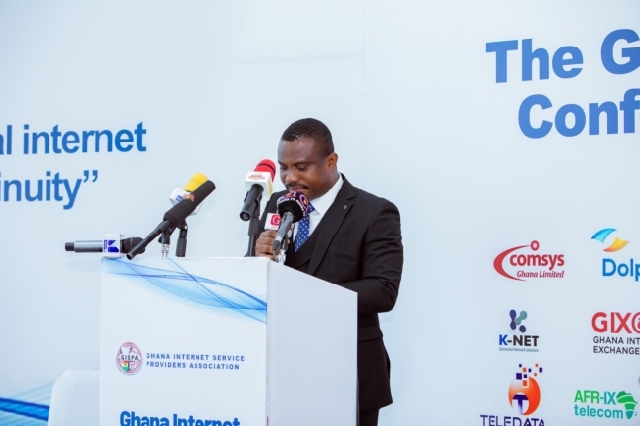GISPA urges urgent action to safeguard Ghana’s digital infrastructure against future disruptions
 President of the Ghana Internet Service Providers Association (GISPA) Mr Michael Nfordzo at the 4th Annual Ghana Internet Conference sponsored by Telecel Wholesale
President of the Ghana Internet Service Providers Association (GISPA) Mr Michael Nfordzo at the 4th Annual Ghana Internet Conference sponsored by Telecel Wholesale
The President of the Ghana Internet Service Providers Association (GISPA), Mr Michael Nfordzo, has called for urgent action to strengthen the country’s digital infrastructure to prevent future internet disruptions.
Speaking at the 4th Annual Ghana Internet Conference sponsored by Telecel Wholesale, under the theme ‘Empowering Ghana: Building a Resilient Local Internet Ecosystem for Business Growth and Continuity,’ the GISPA president emphasised the need for enhanced internet infrastructure and regulatory reforms to support Ghana’s growing digital economy.
On March 14, 2024, Ghana and several other African countries experienced internet disruptions for several weeks due to cable faults affecting the commercial undersea telecommunication cables (CUTC). This resulted in a partial blackout of internet access, impacting internet, data and voice over IP (VolP), the mobile network operators, and the data service providers to varying degrees.
This vulnerability, Mr Nfordzo indicated should move internet service providers (ISPs) to expedite actions to strengthen digital infrastructure installments against future occurrence.
“The recent internet disruptions in our country and across several others in the sub-region, caused by faults in the commercial undersea telecommunication cables (CUTC), highlight the stark reality of our sector's vulnerability if critical investments are ignored. Fortunately, due to the efforts of the Ghana Internet Exchange (GIX), Ghana managed to reduce the impact by keeping local internet traffic within the country, playing a crucial role in maintaining business continuity during these interruptions. However, immediate steps must be taken to strengthen our infrastructure and reduce dependence on international networks to better safeguard against future disruptions," the GISPA president remarked.
The Ghana Internet Exchange (GIX), operated by GISPA, optimises internet traffic within Ghana, reducing costs for users while improving the quality and resilience of local services.
Although the exchange has helped to fortify the nation’s internet ecosystem, further collaboration is needed to build a more robust and reliable digital infrastructure, especially between ISPs, government institutions, and key industries, in creating a stronger peering network to help handle disruptions more effectively and reduce the risk of total internet outages.
The keynote speaker at the 4th Annual Ghana Internet Conference, Prof Jerry John Kponyo, Scientific Director, Responsible Artificial Intelligence Lab, Kwame Nkrumah University of Science & Technology (KNUST), in his address, stressed the importance of a resilient local internet ecosystem for business growth and continuity in the sector.
“A lot is already being done to drive internet growth. However, that cannot be without a resilient local internet ecosystem which is vital in today's digital-first world. Such an ecosystem goes beyond improving internet access; it's about creating a solid digital foundation that can accelerate economic development across all sectors. A truly resilient ecosystem would have multiple redundancies and fail-safes, ensuring that even if international connections are compromised, local businesses can continue to operate with minimal interruption,” Prof Kponyo said.
A key focus of the conference was the affordability of internet services in Ghana.
Stakeholders urged government, policymakers to prioritise regulations that support both affordable internet access and the development of resilient infrastructure. They added affordable and reliable internet was the backbone of our modern economy, thus, asked government to ensure all Ghanaians, especially businesses, had access to these essential services.
The forum also explored the integration of emerging technologies like Starlink and their potential impact on the local internet ecosystem.
While these innovations offered exciting opportunities, stakeholders at the conference cautioned such technologies must complement, rather than compete with local ISPs, in order to maintain a balanced and sustainable digital environment.
The Ghana Internet Service Providers Association (GISPA) is a non-profit trade organisation dedicated to advancing the interests of local Internet Service Providers (ISPs) and other stakeholders in the digital ecosystem. GISPA’s primary mission is to advocate for policies and regulatory frameworks that promote the growth of the internet infrastructure across Ghana, enabling widespread access to reliable, high-quality communication services.
Trending News

CDD-Ghana launches international desk to tackle emerging geopolitics in West and Central Africa
11:18
GA/R: President Mahama nominates Ebi Bright as MCE for TMA
03:30
W/R: Ms Christiana Yankey wins maiden edition of Taadi FM's Mother Tongue Essay Competition
10:44
V/R: Our people are hungry for dev’t, let's rise above litigation – Edem Agbana urges traditional leaders
17:32
CJ suspension: Political parties to stage nationwide protest on May 5
10:32
I delayed the Thank You Tour to allow the Mike Ocquaye report to be concluded - Bawumia
18:45
GA/R: TDC, National Security and Military reclaim encroached Sakumono Ramsar Site in major demolition exercise
13:04
Weija-Gbawe MP cautions Ghana Water over 'careless' Weija Dam spillage
06:11
Tema Traditional Council kick against nomination of Ebi Bright as MCE
09:37
Mike Oquaye report has put an end to propaganda on why we lost: Bawumia
05:44




